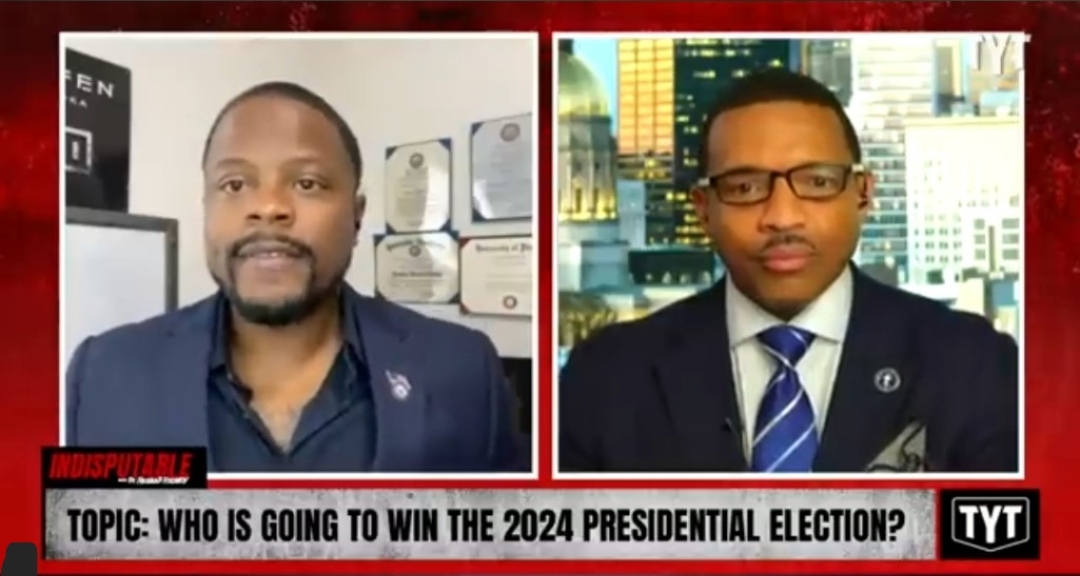In a recent episode of Indisputable with Dr. Rashad Richey, Conservative Joe Collins III took to the TYT network to engage in a fiery debate on the political dynamics leading into the 2024 elections. The conversation was marked by Collins’s unwavering support for former President Donald Trump’s policies, contrasted starkly against Dr. Richey’s incisive critique of their ramifications—particularly for marginalized communities such as Black Americans.
The discussion opened with Collins making a bold prediction: Trump is poised to reclaim the White House in 2024. He pointed to Trump’s influence in crucial battleground states like Pennsylvania, Michigan, and Wisconsin, asserting that these states will play pivotal roles in the electoral outcome. Collins emphasized that the economy would be the defining issue for voters, especially given rising living costs and inflation, which he believes resonate deeply with the electorate’s concerns as they gear up to vote.
Collins didn’t shy away from criticizing current Vice President Kamala Harris, suggesting that her strategies have lacked clarity and effectiveness, despite her nearly four years in office. He questioned her ability to spearhead genuine change amid ongoing economic challenges.
Dr. Richey, however, pushed back against Collins’s assertions regarding Trump’s prospects. Citing polling data, he illustrated a tightly contested race, challenging Collins’s confidence in a Trump victory. The host took a robust stance on the economic impacts of Trump’s presidency, particularly highlighting the significant increase in inflation rates during his term, which, according to Richey, led to a decrease in real household incomes for Black Americans—a demographic that Collins argues should have benefited more from Trump’s policies.
Regarding trade, Collins defended Trump’s tariffs on Chinese goods as a necessary move to safeguard American interests and support farmers. He acknowledged, though, that these tariffs have had complicated repercussions for the agricultural sector, complicating the narrative of unmitigated success.
The topic then veered towards immigration. Collins contended that illegal immigration poses a pressing issue requiring urgent reform and enforcement of the existing laws. Dr. Richey contested this assertion, framing the narrative around immigration as often misleading. He asserted that automation, rather than immigrant labor, plays a far more significant role in job losses, urging a reevaluation of how these narratives shape public perception.
The conversation took a humanizing turn when Richey addressed the terminology used in immigration debates, highlighting how labeling individuals as “illegal immigrants” dehumanizes them. He advocated for a broader understanding of the socio-economic factors that drive migration, such as instability and economic turmoil in migrants’ countries of origin.
As the dialogue expanded, both speakers found common ground on the shortcomings of U.S. foreign policy, particularly its failure to economically stabilize neighboring countries. They reflected on the historical context of U.S. relations with regions like Africa, noting that while previous administrations, particularly under Barack Obama, sought partnerships, those efforts have since declined, failing to address the roots of migration and instability.
Richey took a critical stance on the current political landscape, arguing that militaristic approaches to foreign policy perpetuate cycles of conflict instead of fostering growth and stability. He lamented the lack of effective economic strategies that could lead to meaningful change in regions that desperately need it.
This robust exchange highlights the complex landscape of American politics as the country marches toward the 2024 elections, illuminating the stark divisions in perspectives on economic and social issues.
To catch the full debate and witness the dynamic exchanges between Collins and Dr. Richey, visit https://youtu.be/ettkXwgGP5U?
Published by: Emma Oliver

Leave a Reply